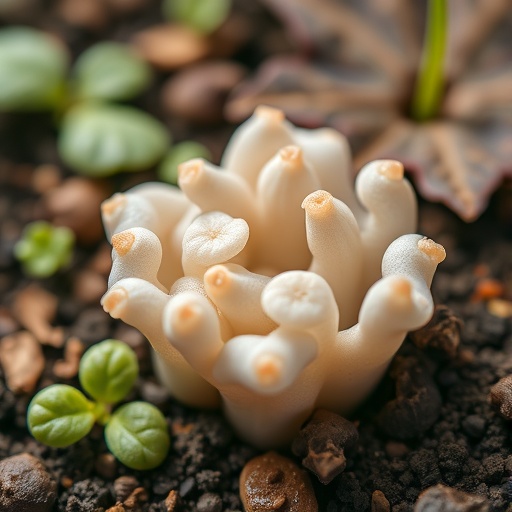In the quest for sustainable agricultural practices, researchers have turned their attention to the potential of rhizobacteria derived from underutilized crops, specifically exploring their roles in promoting plant growth. The study conducted by Fashola, Anagun, and Olanrewaju unveils significant findings regarding the plant growth-promoting potential of rhizobacteria extracted from the roots of two notable yet underappreciated crops: Talinum triangulare and Celosia argentea. This research could pave the way for environmentally friendly approaches to enhance crop yield and health, particularly in regions that rely heavily on sustainable practices.
The global agricultural landscape is increasingly threatened by a multitude of factors, including climate change, soil degradation, and water scarcity. Hence, there is a pressing need to find viable solutions that do not only focus on traditional agricultural inputs but also emphasize bio-based methods to boost productivity. The incorporation of rhizobacteria into farming practices is being recognized as a strategic intervention for improving plant resilience, nutrient uptake, and overall growth.
Rhizobacteria, a group of soil bacteria that colonize plant roots, have been identified as powerful allies in promoting plant health. These microorganisms are known to enhance nutrient availability, produce plant growth hormones, and stimulate local defense mechanisms in plants. In the study by Fashola and colleagues, the researchers isolated and characterized various rhizobacterial strains derived from Talinum triangulare and Celosia argentea. Their findings highlight the unique advantages that these neglected crops present, showing that they are reservoirs of microorganisms that could be harnessed for agricultural advancement.
Both Talinum triangulare, often referred to as waterleaf, and Celosia argentea, commonly known as cockscomb, are valued for their nutritional and medicinal properties. However, they have not received the same level of attention as other mainstream crops. Their cultivation patterns make them ideal candidates for research into rhizobacteria due to their adaptability to diverse growing conditions. This adaptability translates to enhanced interaction with soil microorganisms, thereby bolstering the microbial ecosystem.
In the experimental phase of the study, the researchers employed various methodologies to analyze the plant growth-promoting characteristics of the isolated rhizobacteria. The systematic evaluation included experiments assessing plant height, leaf number, root development, and biomass accumulation in the presence of these beneficial bacteria. Results showed significant improvements in growth metrics when the plants were inoculated with selected rhizobacteria, indicating a robust relationship between these microbes and the plants’ development.
The natural formation of symbiotic relationships between plants and rhizobacteria is well-established; however, this study emphasizes the potential of specific strains to not only enhance growth but also contribute to the soil health. The roots of the target crops provided a promising environment for the rhizobacteria to flourish. This interaction signifies a critical approach towards integrating microbial inoculants into agricultural practices, which could lead to reduced reliance on chemical fertilizers and pesticides.
A major component of this research involved the identification of the mechanisms through which these rhizobacteria affect plant growth. Among the different mechanisms identified, the production of phytohormones like auxins and cytokinins were highlighted. These hormones play essential roles in root elongation, cell division, and overall growth processes, thereby enhancing the plants’ ability to absorb nutrients and water efficiently.
Moreover, the study points out the nitrogen-fixing capabilities of certain rhizobacterial strains. In agricultural ecosystems, nitrogen is a crucial nutrient that often limits plant growth. The ability to convert atmospheric nitrogen into a form accessible to plants represents a significant biological function that can alter the nutrient dynamics within the soil, ultimately boosting crop productivity and sustainability.
The study does not stop at merely confirming the potential of these rhizobacteria but also delves deeper into the implications of employing such biological agents within agricultural systems. With the mounting pressure on fossil fuel-derived fertilizers due to cost and environmental impacts, harnessing the power of rhizobacteria provides a natural and sustainable alternative. This circumvents not only economic challenges but also mitigates detrimental ecological consequences.
The implications for farmers, particularly in developing nations, are profound. By adopting practices that leverage the positive effects of rhizobacteria from underutilized crops, farmers can enhance their yields without extensive financial investment. Education regarding the benefits and application methods of these microbes in everyday farming practices is essential to ensure widespread adoption.
Future agricultural policies and programs might see a shift towards integrating microbial technologies along with traditional agricultural practices. An increased focus on underutilized crops like Talinum triangulare and Celosia argentea could encourage biodiversity and resilience in farming systems. Such an inclusive approach may foster better food security, particularly in regions facing agricultural challenges.
While the study lays a solid foundation for understanding the plant growth-promoting potential of rhizobacteria from these underutilized crops, further investigations are necessary. Future research should focus on field trials to validate laboratory results and explore the economic viability of large-scale applications. Additionally, it would be essential to assess the long-term effects of using these microbial inoculants on crop health and yield.
In conclusion, the pioneering research by Fashola, Anagun, and Olanrewaju moves the conversation forward about sustainable agriculture by revealing the underappreciated power of rhizobacteria. With further exploration and understanding, these microbial allies can play a pivotal role in solving some of the pressing challenges faced by modern agriculture, ushering in a more sustainable future for food production.
Subject of Research: Rhizobacteria from underutilized crops
Article Title: Unveiling the Plant Growth-Promoting Potential of Rhizobacteria from Underutilized Crops of Talinum triangulare and Celosia argentea for Sustainable Agriculture
Article References:
Fashola, M.O., Anagun, O.S., Olanrewaju, O.S. et al. Unveiling the Plant Growth-Promoting Potential of Rhizobacteria from Underutilized Crops of Talinum triangulare and Celosia argentea for Sustainable Agriculture.
Discov Agric 3, 176 (2025). https://doi.org/10.1007/s44279-025-00347-9
Image Credits: AI Generated
DOI: 10.1007/s44279-025-00347-9
Keywords: Rhizobacteria, Sustainable Agriculture, Plant Growth Promotion, Talinum triangulare, Celosia argentea, Microbial Inoculants.




